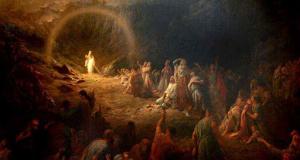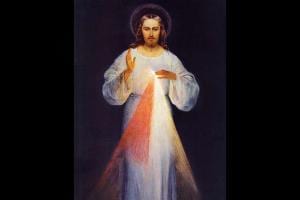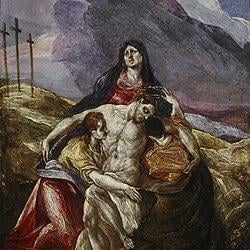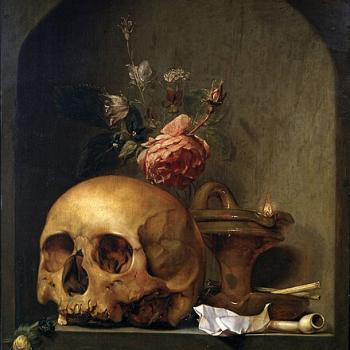I just recently attended a memorial service for someone who died and was raised Catholic. I think they were anyway. They had a prayer service done by a Catholic priest regardless. I don’t think the deceased person attended church or lived out a Catholic life. He wasn’t wicked as far as I know and was a decent good guy who loved his family, friends and good music. Despite not being totally dedicated to the Catholic faith he was unofficially canonized during that service by the priest while at the same time having prayers said for his soul.
I honestly hope that doesn’t happen to me when I die. I actually want a funeral and not a prayer service. I have seen several prayer services and celebrations of life for people I know who died in recent years. Some of whom were raised Catholic. I want the emphasis at my funeral to be on praying for my soul that is hopefully in purgatory. Or better and hopefully not worse. In the Catholic faith I hope to live and die.
Why assume someone is in heaven despite the disregard for anything our faith teaches about how to get to heaven? Hell is a real possibility for those who reject the faith. For those who carelessly and casually just disregard it?
But then again I can’t assume the worst either despite the lack of evidence for the contrary. It really wouldn’t be a prudent decision to tell a room full of grieving people, “Your loved one might be in hell but sorry for your loss.”
Where are the souls of those good people who died but did not live out a particularly Catholic life. Fr. Mike gives a good answer to this question.
This deep question about Eternal Destiny was pondered about in a conversation on Twitter that I came across not too long ago.
Metalifex@SamuelA88226271: (Feb 3)
When I became a father of several very disobedient little boys I finally came to realize how God could love me.
I can discipline my children, but I can never disown them. For better or worse, they are mine.
I cannot believe that I am more merciful than God.
CatholicBard: This is very true. And this is an appropriate topic on this Divine Mercy Sunday. And now Steve Skojec, founder of the Trad website One Peter Five ,who has been in a spiritual drought, bares his soul with heartfelt concern for humanity.
Steve Skojec: @SteveSkojec: (Feb 4)
This has changed me as well. 8 kids, 1 of them a wayward stepchild, 5 of them rowdy boys, all of them people I treated, too often & for too long, almost as mercilessly as I thought God would treat me. But it was wrong and I knew it. I felt it. I had to change. A father’s heart cannot conceive of a thing like hell. We do not torture those we love. Not even when they’re wrong. And certainly, never without a chance at redemption.
But even if we were to grant that our present life should be so decisive, and that somehow, without really knowing if any of what Christianity teaches us is true, we still believe, there’s still so much margin for error. If the saints/private rev. are to be believed, most people don’t go to hell for acts of real malice. They’re not murdering and committing genocide and raping and abusing. They’re doing common human sins of the flesh, or not going to Church, or not going to confession (because they’re not sure it does anything), etc. Many aren’t Catholic or even Christian. Statistically, if EENS is true, the vast majority of people who go to hell go because they don’t believe in something they’ve never believed & don’t know that they SHOULD believe. Christianity is a minority view in the world. Always has been.

CatholicBard: For those who don’t know what EENS means “Outside the Church there is no salvation” (Extra ecclesiam nulla sal)
Steve Skojec: @SteveSkojec: So at the very least, for the people who are trying to live as decently as they know how within the cultural mores they find themselves in, even if that entails a good deal of what Catholics would class as sin, you’d think they shouldn’t be tortured for all eternity for that.
And for all the Catholics who have tried to be decent, but largely fallen short — especially those influenced by a very lax and uninspiring ecclesiastical culture — again, do they get tortured forever for being Christmas & Easter Catholics? Eating meat on Lenten Fridays?
None of that makes sense. None of any of it does. If God truly wants us to be with him, why does he make it so damn hard to believe? Why does he give us a Church that is one of the most corrupt institutions on the planet and make us slaves to it out of required obedience?
CatholicBard: Steve really asks some great and heartfelt questions here. I symphonize with the thoughts here and get annoyed when too many Catholics and other Christians just easily dismiss these concerns. You don’t have to look hard to find the opinion that most of humanity is going to hell. This has been a dominant theological opinion since the time of Augustine. But it is not the only view nor is it the official view of the church. Some believe that in the end everyone will be saved. Some believe in a variation popularized by theologian Hans Vons Balthazar and Bishop Robert Barron called ‘Dare We Hope’. This proposes that we do not know for certain anyone is in hell but the possibility remains and we hope that people don’t end up there. It is not universalism.
David Mills posted on Facebook-
This is not universalism. Universalism is not an accepted position of Catholic faith. But those who do actually believe it are believing in it for very good reasons.
In this last section of this article here are some answers to some objections to those who hold a universalist objection by a former fellow Patheos Catholic writer and First Peter Five contributor Avellina Balestri.
While I am in the cautiously optimistic “Dare we hope” camp, I do run into a lot of poor arguments leveled against Universalists/Restorationists by their fellow Christians which I think should be set straight.
- The position denies the merits of the Cross.
It really doesn’t…if anything, Universalists are saying the merits of the Cross are so powerful in bearing the burdens of sin and its effects that ultimately, no matter how windy the road may be, all evil will be consumed wholly and all creatures freed from its deforming grasp. I get that opposition might be raised with regards to the need to accept this gift, explicitly or implicitly, but the hope for Universalists is that no one would resist it eternally and God would triumph through their redemption by being “all in all.”
- It denies judgement and punishment.
Most Universalists are believers in some type of post-mortem punishment, though they see it as ultimately serving to bring the individual to recognize their own wrong-headedness and repent. In essence, they believe in a justice that has the power to lead towards reformation. That having been said, some of the most chilling descriptions of hell I have read are from Universalist literary giant George MacDonald, who combined the idea of separation from God with His love wrongly received akin to a “black flame”, in which the sinner is allowed to be his own god and surrendered to the torments of his own twisted soul, a truly nightmarish prospect.
- It denies free will.
Free will is one of the better defenses for hell, everlasting or otherwise, with C.S. Lewis remarking that the doors are locked from the inside. Perhaps this is indeed the case, and some souls are simply too far gone to wake from their own nightmare. I can certainly envision that as a real possibility. If this is the case, though, it still creates an image of God losing a little battle to Satan and our own stubbornness. The Universalist view suggests that even the hardest sinner could not hold out against the divine calling indefinitely, since no matter how deformed we have made ourselves, we are still bearing the image of God. The concept presented, then, is not cohesion on God’s part but a divine appeal that never entirely ceases and ultimately breaks into our hearts by virtue of our only true identity in God.
- “Jesus spoke more about hell than anyone.”
It’s not nearly so clear cut. Yes, it is undeniable He spoke plenty about judgement and punishment throughout the four Gospels, but I think the texts are varied in imagery enough to make arguments possible for unending torment, the annihilation of the unjust, or their ultimate release from bondage. Also, it is often hard to distinguish in many texts whether Christ is talking about a post-mortem punishment or earthly judgement, as certain language involving fire and worms seems to be taken from the Old Testament regarding this-world punishment, and the destruction of Jerusalem is always looming in many of Christ’s warnings. In addition to this, there is the issue of the separation of the righteous and the wicked in the New Heavens and the New Earth, and what exactly “age” means. The debates can and have raged on…but it’s simply not as clear-cut as some people make it.
5. It discourages Evangelism.
I feel like hell, everlasting or otherwise, used as a major tool for Evangelism is quite problematic. It can come off like a strong-arming tactic, especially when the need to insist upon its unending nature is thrown in. This, I believe, turns away more people than it draws in. I am not saying we should cease to warn people about the consequences of sin upon the soul, but this can take many forms that are not solely dependent upon the threat of an everlasting hell. To say Universalists are “bad Christians” for not pulling the everlasting card in order to assure good conduct I think is extremely unfair to them.
6. It is all about emotions.
Honestly, most Universalists I know are not just tufts of fluff who can’t handle the prospect of sin being punished. What they are actually doing is trying to make sense of what Christians have always struggled to interpret sensibly: A loving God being content to allow the endless torment of potentially billions of His creatures for no greater purpose than itself. Both emotions *and* intellect struggle to fit this prospect into the Christian narrative, but it has always required a certain amount of mental gymnastics. Julian of Norwich herself struggled with the prospect, asking how all things could be well when so many souls were to suffer damnation, i.e. endless separation from God. Perhaps I am in the same boat, and always have been. But I continue to pray for and treasure the hope that, somehow, through the divine graciousness, every shattered image of God may yet be repaired, and not one shall go lost who may not, somehow, be found.
Catholic Bard: I would add a 7th reason why Universalists position is understandable. It is because they believe in this.

Jesus I Trust In You
I think the reality of eternal destiny is summed up nicely in this quote I found in an article about purgatory. It is one of the best explanations I have ever come across.
The fires of hell, the suffering fires of purgatory, and the all-consuming bliss of beatitude are one thing, the same One. When the soul is freed from the confines, and limits, and filter of the physical body, it rushes back to the Love from whence it proceeded. That soul’s experience of His presence will be hell, purification, or the light of beatitude, depending on its conformity or lack of conformity to God’s love. -Sonja Corbitt Purgatory is a Person – SpiritualDirection.com
Click here for a fuller conversation about his topic. Dare We Have a Conversation About Hope?
And this topic is also included in this post Some Catholic Hot Takes
And some more helpful conversations on this topic.
What “No Salvation Outside the Church” Means | Catholic Answers
I













